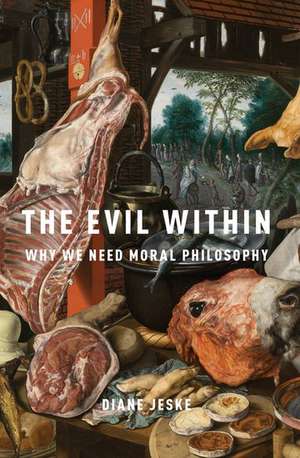The Evil Within: Why We Need Moral Philosophy
Autor Diane Jeskeen Limba Engleză Paperback – 10 oct 2019
| Toate formatele și edițiile | Preț | Express |
|---|---|---|
| Paperback (1) | 153.62 lei 10-16 zile | |
| Oxford University Press – 10 oct 2019 | 153.62 lei 10-16 zile | |
| Hardback (1) | 198.22 lei 10-16 zile | |
| Oxford University Press – noi 2018 | 198.22 lei 10-16 zile |
Preț: 153.62 lei
Preț vechi: 186.02 lei
-17% Nou
Puncte Express: 230
Preț estimativ în valută:
29.40€ • 30.77$ • 24.47£
29.40€ • 30.77$ • 24.47£
Carte disponibilă
Livrare economică 27 februarie-05 martie
Preluare comenzi: 021 569.72.76
Specificații
ISBN-13: 9780190074135
ISBN-10: 0190074132
Pagini: 298
Dimensiuni: 208 x 137 x 20 mm
Greutate: 0.36 kg
Editura: Oxford University Press
Colecția OUP USA
Locul publicării:New York, United States
ISBN-10: 0190074132
Pagini: 298
Dimensiuni: 208 x 137 x 20 mm
Greutate: 0.36 kg
Editura: Oxford University Press
Colecția OUP USA
Locul publicării:New York, United States
Recenzii
Does moral philosophy matter? In this brilliantly clear, accessible book, Diane Jeske employs real-life cases to show how moral self-deception leads us astray. Being better people requires better moral thinking. Everyone should read this challenging book.
The Evil Within made me both feel deeply and think carefully. By drawing on interviews, memoirs, and biographies, Jeske offers gripping stories about several figures -slave holders, Nazis, and one psychopathic serial killer- who are quite bad people, but she doesn't let the reader simply condemn and dismiss these characters with the comforting thought that 'at least I could never be like them.' On the contrary, Jeske challenges every reader to look within and ask themselves what they may have in common with people who are complicit with evil. Moral philosophy, she argues, helps with this self-scrutiny: to become better people, we need to understand both what makes an action wrong and what may lead us to perform actions that we know are wrong. This book is for anyone ready to engage in the tough work of assessing ourselves morally and trying to be better.
Diane Jeske's penetrating study of evil is the philosophical equivalent of an action-packed thriller. Few theoretical contributions are so riveting, so engrossing, so seductive that they cannot be put down. Jeske's book is that rare exception. Through vivid case studies that range from Nazis to American presidents, from slave owners to serial killers, Jeske delves into the moral dimensions of evil, the psychological devices that enable it to flourish, the grounds upon which it is legitimately excused, and the conditions under which even the best of us might succumb to its temptations. Her new philosophical moves invigorate old moral debates and her use of the tragic choices and compromised commitments of famous people reveal how frighteningly thin the line can be between good and evil. Jeske's book is a haunting reminder that living on the right side of that line requires not just moral knowledge but vigilant stewardship of one's character.
The Evil Within made me both feel deeply and think carefully. By drawing on interviews, memoirs, and biographies, Jeske offers gripping stories about several figures -slave holders, Nazis, and one psychopathic serial killer- who are quite bad people, but she doesn't let the reader simply condemn and dismiss these characters with the comforting thought that 'at least I could never be like them.' On the contrary, Jeske challenges every reader to look within and ask themselves what they may have in common with people who are complicit with evil. Moral philosophy, she argues, helps with this self-scrutiny: to become better people, we need to understand both what makes an action wrong and what may lead us to perform actions that we know are wrong. This book is for anyone ready to engage in the tough work of assessing ourselves morally and trying to be better.
Diane Jeske's penetrating study of evil is the philosophical equivalent of an action-packed thriller. Few theoretical contributions are so riveting, so engrossing, so seductive that they cannot be put down. Jeske's book is that rare exception. Through vivid case studies that range from Nazis to American presidents, from slave owners to serial killers, Jeske delves into the moral dimensions of evil, the psychological devices that enable it to flourish, the grounds upon which it is legitimately excused, and the conditions under which even the best of us might succumb to its temptations. Her new philosophical moves invigorate old moral debates and her use of the tragic choices and compromised commitments of famous people reveal how frighteningly thin the line can be between good and evil. Jeske's book is a haunting reminder that living on the right side of that line requires not just moral knowledge but vigilant stewardship of one's character.
Notă biografică
Diane Jeske is a Professor of Philosophy at the University of Iowa, where she has taught since 1992. She received her PhD at MIT. Her publications have focused on issues concerning the nature of friendship and our obligations to friends and other intimates. She is the author of Rationality and Moral Theory: How Intimacy Generates Reasons (Routledge, 2008).
